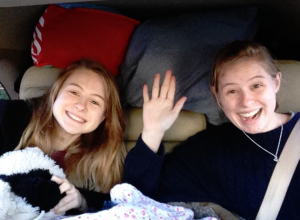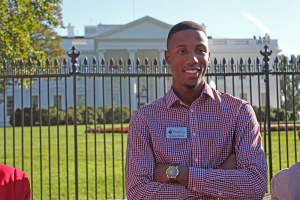This is not my story. It may be about me, but it’s really a story of pain. A story that everyone can relate to in one way or another.
We view pain as an obstacle to overcome, a nuisance that must be obliterated, and yet, I think all of us realize that it is inevitable. Even at the young age of 18, having experienced little trauma or loss, I can still recognize this undeniable truth: No one lives without some form of pain.
Still, we never really just talk about it. Sure, we talk about it privately in therapy or with a really close friend or publicly in best-selling memoirs, but in the day-to-day, how often do you just acknowledge any pain you may be feeling and share it? Probably not that often. That would be weird right?
It would be weird if, in a casual conversation with a coworker, you told them you woke up worrying you were wasting your life.
It would be awkward and uncomfortable. But it shouldn’t be. If we all experience hurt to varying degrees, day in and day out, why is it so weird to talk about it like it’s normal? The more we hide our pain, the more we stigmatize it until it becomes taboo to talk about, suppress it until it rots our very core, and we isolate ourselves so that our pain becomes a defining characteristic of who we are.
It is in our attachment to pain that it gains its power over us, that it turns in to all-consuming suffering. We can never eliminate pain from this world; even the Dalai Lama, who has dedicated his life to eliminating suffering, hurt deeply when he lost his brother. However, we can deprive it of its power. We need to bring it out into the open, acknowledge it as part of everyday life, talk about it like we discuss our morning commute. We need to stop seeing discussion of our pain as weak or depressing or a cry for attention. Once we acknowledge discomfort and negative emotions as part of everyday life, they may still hurt but they will cease to control us.
In being open about it, we will gain a deeper understanding of our pain and empathy for that of others. We will be less harsh on ourselves for having bad days. We will cease to desperately grasp at fleeting glimpses of pleasure from eating or getting drunk or watching a movie. We will begin to let go of the many ways in which the pain we feel can build upon itself and dictate our lives. I may just be another story. Another story of depression or anxiety or an eating disorder.
Another story of just one type of pain.
But my story should be told as should everyone else’s. It doesn’t have to be like this — told in some grandiose fashion — but it should be told naturally, in casual conversation. When someone asks me how I’m doing, I don’t want my automatic response to be “good.” I want to be able to stop and really think about it and give an honest answer, even if that’s “it was a real struggle to get out of bed this morning and I’m just fumbling through my day.”
So pretend for a second that we’re just two friends talking about our day. You ask me how I am, and I finally say all the things I haven’t said the millions of other times people have asked me: For as long as I can remember, I haven’t liked myself, and I’ve let it screw with my head and my life in more ways than I can count.
I have moments of pride during my day to day and can identify periods of my past where I felt good about myself, but self-loathing is my default.
In my mind, everything bad in the world, every negative emotion, every flicker of a glance that my brain can interpret as a negative emotion is somehow my fault, and my accomplishments are solely the product of luck and privilege because my mind can’t possibly fathom that I could be responsible for any positivity in this world. These thoughts haunt me whenever I look in the mirror, eat, exercise, talk to someone, open  my mouth in class, and try to get out of bed or go to sleep. It makes it hard for me to interact with people. I spend so much time and effort analyzing every tiny aspect of nearly all social interactions that it starts being more tiring than fun.
my mouth in class, and try to get out of bed or go to sleep. It makes it hard for me to interact with people. I spend so much time and effort analyzing every tiny aspect of nearly all social interactions that it starts being more tiring than fun.
It’s introversion to a stifling degree. Because of that, any semblance of a social life I had has been gradually deteriorating since the beginning of my junior year of high school. I currently only have two actual friends, both of whom live hours away from me and have only barely seen the surface of what I’ve been struggling with. Because I rarely spend time with people in my dorm, a hall-mate once asked “so who do you hang out with?” I remember feeling a rush of anxiety as I stumbled through an answer in order to hide the truth: no one.
I’ve grasped at various things to give me self worth. I throw myself into school work, with marvelous results but only a fleeting sense of accomplishment. I’ve tried putting everything I have into fixing other people who are struggling, hoping that if I can just make their lives better, I’ll be worth something to myself.
But inevitably, I obviously can’t eliminate their pain, and when the relationship fails, I am just left feeling even more like a failure.
I’ve put a lot of my emotions into body image, weight, food and exercise and have struggled with varying types and degrees of eating disorders throughout high school. Until I left for college, I weighed myself at least twice a day, usually closer to 6-8 times. I used to come home from school almost everyday and consume ridiculous amounts of food before going to the gym, where I would workout to exhaustion so that I could come home and eat more.
That changed during the second half of my senior year when I developed orthorexia, a fixation on eating “proper” foods and subsequently lost 20 pounds. But magically, I still didn’t like myself. Some part of my brain said “to hell with it,” and I went back to binge eating, being healthy during the day in front of other people so that I wouldn’t feel guilty about about the large quantities of junk that I ate when no one was watching.
I gained back all that weight due to binge eating, but still, all the food in the world couldn’t make me like myself. I used to sob uncontrollably when I was alone, mostly at night before I went to sleep. I also learned to cry in the presence of others without them noticing or to run to the bathroom, cry for five minutes, and dry my eyes before coming back to class.
However, over the last few months, the emotion I’ve feel most often, if you can call it that, is plain exhaustion.
I sleep a lot more and sometimes it takes me hours to get out of bed in the morning because I become so paralyzed with thoughts about how worthless I am or how few things in life feel fun or exciting anymore. I’ve started having these moods, often after extended social interaction or for no reason at all, where I begin feeling tired, weak, and stiff. Every task becomes seemingly insurmountable; I fear someone addressing me because finding words feels so difficult, and the only thing I can think about is getting back to my room. That’s where the suicidal thoughts come in, not often but its happened when I’m just so exhausted by my thoughts and want to shut them up.
I fantasize about it, research it, search for a gun I won’t find, close my eyes while driving down an empty highway. Never coming close because I never actually want to die but letting it sit as a comfort in my brain that I ultimately control my thoughts. Everything I’ve described has some sort of name, and I am seeking help for those issues. But that’s not the point of this particular piece. The point is that my honest answer to the question “how are you” shouldn’t have to be hundreds of words worth of pain, written during all those years of saying “I’m fine.”
I should have been able to answer that question honestly whenever it was asked and slowly get every little pain off my chest each day in normal conversation.
I unfortunately don’t think I have the courage to do that yet (I put all my courage into writing this), but I hope to one day. I hope everyone does one day. I hope it becomes normal to acknowledge and talk about the hurt we all feel.
Now its your turn to share. How are you feeling?
(side note: These are far from my own ideas. I’m summarizing a few bits and pieces of centuries of teachings (primarily Buddhist in nature) that have only begun to permeate the western world in the last few decades. If any of these ideas really stuck to you and you want to hear about them from far more intelligent people than me, I suggest Happiness by Mathew Ricard, How to Meditate by Kathleen McDonald, or The Tibetan Book of Living and Dying by Sogyal Rinpoche)





